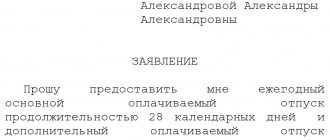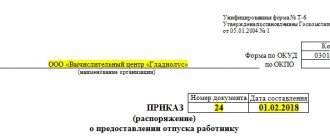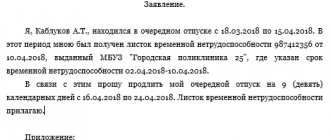11.09.2019
0
3937
5 minutes.
The rights of single mothers under the Labor Code are given a certain priority in relation to other employees. This is expressed in the ability to choose a vacation period, accrue social benefits, receive protection and other government benefits. We will find out in the article what else women raising a child without a husband can claim and under what circumstances.
Legislation
The issue related to the provision of additional leave for a single mother is regulated by the Labor Code of the Russian Federation and is subject to mandatory execution by the employer.
Labor Code
Article 263 of the Labor Code of the Russian Federation determines the procedure and rules for registering leave. It also regulates the issue of payment and the number of days.
According to Articles 75 and 76 of the Labor Code of the Russian Federation, additional leave is provided to single mothers without taking into account holidays and weekends.
Does a single mother lose personal income tax benefits if she gets married? See here.
“subsidies mortgage agency of Ugra payments 2012”
Employees under 18 years of age go on vacation at their own request, and their vacation will be at least 31 days (Article 267 of the Labor Code of the Russian Federation). Parents with a disabled minor child also plan their own annual leave (Art.
Labor Code of the Russian Federation);
- the commission by an employee performing educational functions of an immoral offense incompatible with the continuation of this work (clause 8 of Article 81 of the Labor Code of the Russian Federation);
- a single gross violation by the head of the organization (branch, representative office), his deputies of their labor duties (clause 10 of Article 81 of the Labor Code of the Russian Federation);
- the employee submits false documents to the employer when concluding an employment contract (clause 11 of article 81 of the Labor Code of the Russian Federation);
- in the case of a teaching worker, including one-time use, of educational methods associated with physical and (or) mental violence against the personality of a student or pupil (clause 2 of Art.
Attention
Leave for single mothers in summer Part four of Art. 123 of the Labor Code of the Russian Federation establishes that certain categories of employees, in cases provided for by the Labor Code of the Russian Federation and other federal laws, are granted annual paid leave at their request at a time convenient for them. However, neither the Labor Code of the Russian Federation nor other federal laws stipulate that single mothers with two children have the right to use vacation at a time convenient for them. At the same time, the right of a woman with two or more children under the age of 12 to receive annual leave in the summer or other time convenient for them was established in paragraphs.
Are single mothers entitled to additional leave? Article 263 of the Russian Labor Code provides for the possibility of granting additional leaves with or without pay.
Such needs include expanding your living space. The right to expand living space In order to get on the waiting list for expanded housing conditions, a woman must be under 35 years old. To do this, single mothers need to prepare a package of documents. All documents are submitted for consideration to the housing commission, which is located in the administration at the applicant’s place of residence. The list of documents includes:
- statement;
- passport of the applicant;
- single mother certificate;
- certificates of income and the value of property owned;
- a document establishing the fact of the child’s birth;
- document confirming registration for 10 years;
- certificate of inspection of living space for the last five years.
In individual cases, department specialists may request other documents from the applicant.
Procedure for provision
The rules for applying for vacation in 2021 have not changed and remain the same as they were before. In order to apply for extraordinary leave, you must write an application addressed to the manager.
In this case, you should indicate from what date to what date rest is required. But, it should be borne in mind that if additional leave is provided urgently, it will not be paid.
If you need to add vacation days to the main one, then you also need to write an application. In this case, payment will be made on a general basis.
Additional leave is provided only once a year.
Documentation
To be granted leave, you must confirm your status as a single mother. To do this, you must provide a certificate. It is issued by social security authorities.
It is this document that serves as the basis for receiving all types of benefits and allowances.
A sample certificate for Form 25 is here.
When is it legal to take vacation?
The law requires that each organization approve a vacation schedule 2 weeks before the new year. This document determines the sequence of granting vacations to employees over the next year.
Since the schedule takes into account the wishes of employees, in some companies employees participate in its formation. But such interaction does not always work out, especially if the organization has many employees and it is not possible to take into account everyone’s wishes, or if the person has not yet decided when to go on vacation. In addition, employers provide vacations in proportion to the time worked, and not in advance, and this also affects which month you can go on vacation.
Despite the presence of a schedule, both childless employees and families have the opportunity to choose a suitable period for rest. But for this you need to come to an agreement with your superiors. In principle, the employer is not obliged to agree, but many make concessions.
What to do if they don’t give it?
There are certain conditions for granting leave:
- the woman officially has the status of a single mother;
- The employee has not taken additional leave over the past year.
If the 2 specified requirements are met, then the woman can count on additional admission.
Expert opinion
Mikhailov Vladislav Ivanovich
Lawyer with 6 years of experience. Specializes in family law. Knows everything about the law.
But it happens that the employer refuses to provide rest, without any reason. In such a situation, you should go to court.
But an important point should be taken into account: no more than 3 months should pass. And the employer, on the basis of Article 62 of the Labor Code of the Russian Federation, will have to provide all the data that is necessary for the proceedings. According to Article 393 of the Labor Code of the Russian Federation, in labor disputes the plaintiff does not pay the state fee.
Are there social benefits for single mothers? Information here.
Do they have the right to fire a single mother from her job? Details in this article.
In court it will be necessary to prove that the request for leave actually took place.
A copy of the vacation application is suitable for this. But it is necessary that it be certified by a notary. If the outcome of the case is successful, the employee will be granted additional leave.
Labor Code of the Russian Federation
Hello. We need your help very urgently. Explain to the unreasonable mother my rights. I am raising two children alone - a 14-year-old daughter (she has a father who is simply written down in her certificate; we were not married) and a 4-year-old son (with him I am a single mother). I got a job on July 12, 2011. I wrote an application for leave from 06.08.
2012, and the boss only signed me for 14 days... Is this fair? I worked for a whole year, and I only had 14 days.. I wanted to take the children to the seaside - the baby was sick all fall and winter.. And here it is. Can you tell me how I can appeal, demanding my full vacation? Can you tell me the number of the article or law? Joy Let's start with the fact that the law (neither in the Labor Code of the Russian Federation, nor in other federal laws) does not establish the obligation of employers to provide working single mothers with leave at a time convenient for them.
We invite you to read: In what cases will you have to return a privatized apartment to the state?
Important
The Labor Code of the Russian Federation establishes that certain categories of employees, in cases provided for by the Labor Code of the Russian Federation and other federal laws, are granted annual paid leave at their request at a time convenient for them. Does a single mother raising two children aged 8 and 14 have the right to another annual paid leave at a time convenient for her? In accordance with Art. 122, 123 of the Labor Code of the Russian Federation, paid must be provided to the employee annually in accordance with the schedule. Part 4 of Art. 123 of the Labor Code of the Russian Federation establishes that certain categories of employees, in cases provided for by the Labor Code of the Russian Federation and other federal laws, are granted annual paid leave at their request at a time convenient for them.
However, neither the Labor Code of the Russian Federation nor other federal laws stipulate that single mothers with two children have the right to use it at a time convenient for them.
In case of refusal to grant leave, you can safely contact human rights bodies, since there is a violation of a woman’s legal rights.
First of all, you need to try to defend your rights “on the spot.” To do this, you should submit a complaint to the employer in order to resolve the issue pre-trial. If the conflict cannot be resolved in this way, then the next step may be to contact the state labor inspectorate.
The next stages include appeals to government authorities - the prosecutor's office and the court. When considering an application in a judicial authority, the plaintiff will not pay the state fee, in accordance with Art. 393 of the Labor Code of the Russian Federation.
In the courtroom, the mother will need to prove that she really has the right to rest, and that she previously contacted the employer and filed a complaint. It is advisable that the mother has in her hands a notarized copy of the application for leave, with a note of receipt by management, and other documents confirming her words.
Video about payments
- Due to frequent changes in legislation, information sometimes becomes outdated faster than we can update it on the website.
- All cases are very individual and depend on many factors. Basic information does not guarantee a solution to your specific problems.
That's why FREE expert consultants work for you around the clock!
- via the form (below), or via online chat
- Call the hotline:
APPLICATIONS AND CALLS ARE ACCEPTED 24/7 and 7 days a week.
Women raising a child on their own have a number of benefits, including in labor relations. Some of them are concerned about the question of whether single mothers are entitled to additional leave. The legislation provides special rights for this category of persons.
How to obtain single mother status.
Not every woman with a dependent child and without a husband is a single mother.
Officially, status and a certificate that gives the right to benefits can be obtained if:
- the father is not listed on the birth certificate;
- the child was born 300 or more days after the divorce;
- if the woman independently registered the adoption of the baby;
- in the case where paternity is challenged by a man in court.
The status is established on the basis of a certificate that will be issued by the registry office.
To confirm it, you must have a dash in the father column on the child’s birth certificate.
Benefits for a single mother.
For women raising a child on their own, the following benefits are provided:
- registration of part-time work;
- refusal of business trips or additional workload outside working hours;
- employment on night shifts is permitted with written consent;
- annual leave for single mothers up to 14 years of age.
Part-time work is established either immediately upon signing the employment contract, or after the employee begins her duties. The fact that the employee works in this mode is not indicated in her documents (work book).
Women raising children on their own may be required to work at night only with their written consent. At the same time, it is prohibited to use their labor at this time if their health does not allow.
In order to terminate an employment contract with a single mother, the following grounds must exist:
- gross violation of one's labor duties;
- bankruptcy of an enterprise;
- if the employee has been repeatedly subject to disciplinary sanctions.
An employee who is a single mother is granted an additional 14 days of leave each year.
This right is established by labor legislation, but must also be contained in a collective agreement or other document regulating the relationship between employees and the employer.
A woman should keep in mind that additional vacation days are not paid.
General information
If a woman is a single mother, then she is entitled to benefits. Including labor ones. But who is a single mom and who isn't?
The status is assigned in the following cases:
- if a woman gave birth to a child out of wedlock and paternity is not officially recognized;
- if a woman independently took a child from an orphanage for the purpose of adoption or guardianship;
- if the entry about the father in the child’s document is made only on the basis of the words of the mother;
- if the fact of paternity is refuted in court.
It should be clarified that when a woman gives birth to a baby within 300 days after the divorce process or the death of her husband, the child is registered with the father indicated on the birth certificate.
The status is assigned based on a certificate from the registry office. The whole process is formalized at the social welfare department, and a certificate is necessarily issued.
Privileges
A single mother's status is entitled to a number of benefits. These include labor:
- restrictions on working hours at night;
- assignments on business trips, additional workload for hours, involvement in work on non-working days and holidays;
- additional leave;
- the possibility of providing a preferential labor regime - part-time work;
- provision of additional days off for the purpose of caring for disabled children;
- special cases of dismissal.
According to the law, single mothers can be involved in night work only on the basis of shift consent. If the employee refuses, the employer does not have the right to impose a disciplinary sanction on her.
Women are sent on business trips only with their written consent. There is also the issue of difficulty on weekends and holidays.
In addition, in this case there is one more condition - the employee, even with written consent to go to work at night, cannot be involved in the event of serious health problems.
Additional leave is mandatory for all single mothers. But there is a nuance - this must be established by a collective agreement. The employee must provide an application for registration.
Additional leave is not paid. But it can be assigned to the main one, then the employer will pay for it.
If necessary, the employee may request part-time work.
In this case, the schedule can be set at any time - during the process of signing the contract or after the employee has begun to perform his duties. The fact that the employee works on a part-time schedule is not displayed anywhere.
Additional days off must also be provided upon the employee’s first request.
According to Article 262 of the Labor Code of the Russian Federation, each single mother is entitled to 4 additional days of rest per month. If the weekends have not been used, they cannot be folded.
Firing a single mother is also a special process. The manager does not have the right to deprive an employee of her job just at his own request.
According to Article 261 of the Labor Code of the Russian Federation, dismissal can be made only in several cases:
- upon liquidation of the organization;
- due to disciplinary sanctions;
- due to serious breaches of duty.
Legislative acts.
Benefits provided to a single mother are regulated by the Labor Code of the Russian Federation. If an employer violates a woman’s rights, he may be fined by regulatory authorities.
In Art. 262 establishes the manager’s obligation to provide employees raising a child on their own with 4 additional days off every month.
These days are not paid and are not cumulative. If you do not use them within a month, the weekends “burn out” and no compensation is provided for them.
Single mothers are granted leave at their own expense for two weeks each year. This time is allowed to be added to the main paid leave. Days are counted excluding holidays and weekends.
If additional leave is not used during the year, it is not carried over to the next period. This time cannot be compensated in monetary terms.
The provision of additional leave to a single mother and its duration is also regulated by Art. 75 and 76 of the Labor Code.
Benefits for certain categories in the field of relations with the employer are prescribed in the Collective Agreement or agreement signed upon hiring.
How to get additional leave.
Single mothers can take additional unpaid time off at any time upon their written request.
The vacation schedule is drawn up in the organization at the end of the calendar year for the next period. All employees must familiarize themselves with the document and sign it.
At the same time, additional vacation does not have to coincide with the main one. A woman has the right to take these days at any time convenient for her.
To receive additional leave, you will need to write an application to the head of the organization.
A single mother can take two weeks at her own expense only once a year, unless otherwise stated in the employment contract.
To receive additional rest time, you must provide a document confirming your right to the benefit.
It is a single mother's certificate (or a dash in the birth certificate), which can be obtained at the social security department on the basis of a certificate from the registry office where the birth certificate was received.









